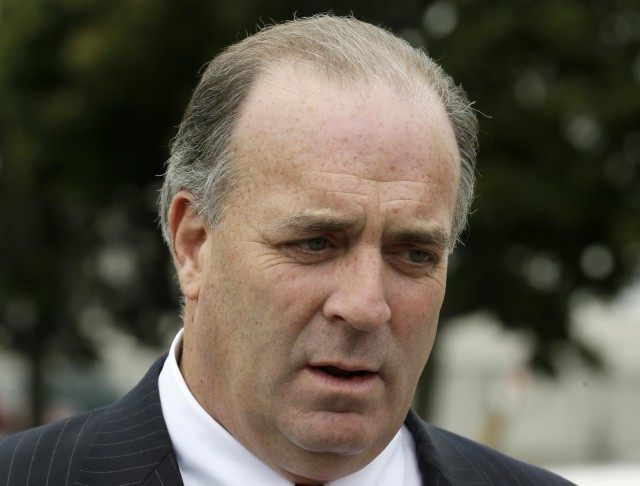WASHINGTON (AP) — Four Democrats, including one who represents an American hostage in Iran, said Thursday they would support the Iran nuclear deal in a major boost for President Barack Obama.
“It’s very clear to me that the agreement is the best path forward,” two-term Michigan Rep. Dan Kildee, who counts hostage Amir Hekmati as a constituent, told The Associated Press in an interview. “This agreement allows us to prevent (Iran) from gaining a nuclear weapon, and if they cheat, we will know it. If we don’t have the agreement, we don’t have that certainty.”
Hekmati, an American, has been held in Iran since 2011. Kildee said he has told Obama and Hekmati’s relatives about his decision to back the international agreement, which calls on Iran to curb its nuclear program in exchange for billions of dollars in sanctions relief.
Rep. Chris Van Hollen of Maryland, the top Democrat on the House Budget Committee and a Senate candidate, said he would support the agreement, calling it “the best path to achieve our goal of ensuring that Iran never obtains a nuclear weapon.”
A former sergeant in the U.S. Marine Corps, Hekmati was visiting his ailing grandmother in 2011 when he was arrested on suspicion of spying. He was charged in January 2012 with espionage and sentenced to death. His family denies the charge. He is one of four Americans held by Iran.
New Mexico Democratic Sen. Tom Udall and Rep. David Price, D-N.C., also announced their support for the agreement, a boost for Obama amid a week of furious lobbying on Capitol Hill.
“We have a choice between this deal or no deal” to stop Iran from developing a nuclear bomb, Udall said from the Senate floor. “I do not believe we will get another chance.”
Price said he believes the accord will “make the world a safer place.”
Rejecting the deal “would threaten not just our credibility on the international stage, but also our national security and that of our allies,” Price said in a statement. “That is not a risk I am willing to take.”
Their statements come after multiple White House meetings this week between Obama and House Democrats, intended to counter an intense lobbying effort by AIPAC, which is behind a multimillion-dollar ad campaign. The pro-Israel lobby argues that Iran cannot be trusted. Obama and his allies say there is no alternative to the deal other than to let Iran proceed unsupervised.
Senate Majority Leader Mitch McConnell, R-Ky., who has criticized the accord, reiterated his demand that the Obama administration turn over documents related to agreements between the IAEA and Iran that he described as “side agreements.” Secretary of State John Kerry has said there are no side agreements relevant to the accord.
The Republican-led Congress is in the midst of a 60-day review of the deal and is expected to vote in September on a resolution of disapproval that Obama has vowed to veto. The administration’s goal is to ensure it has enough Democratic votes to sustain the veto.
Obama has aggressively courted Democrats, holding sessions at the White House and sending Cabinet members to Capitol Hill for briefings and hearings.
Vice President Joe Biden held a working breakfast Thursday morning with members of the House Democratic Caucus. The White House says he made the case that the deal cuts off Iran’s pathways toward a nuclear weapon and includes strong verification protocols to make sure Iran lives up to its obligations.
Supporters and opponents are urging members to decide and announce their positions, in the hopes that those who have gone public will inspire others to follow. Rep. Sander Levin, D-Mich., announced this week that he’d support the deal. Sen. Joe Manchin, D-W.Va., said he is leaning toward supporting the deal. Rep. Grace Meng, D-N.Y., said Wednesday she opposes it.
Kildee said he let Obama know of his decision Wednesday night. He said he ultimately he rejected the argument against the deal, in which opponents suggested the U.S. could reject and then renegotiate it to further tighten enforcement on Iran.
Kildee said the U.S. would lose its credibility by backing away from the agreement, and if that happened, there likely would be no new negotiations.
“That’s not a practical alternative,” he said.
At a Senate Foreign Relations Committee hearing Thursday, the chairman and top Democrat said they had requested a classified or open briefing with the top official of the International Atomic Energy Agency to better understand its role in verifying that Iran doesn’t cheat.
Sen. Chris Coons, D-Del., said the IAEA official declined the invitation “because he did not want to be seen as interfering in our legislative process.”
Coons said he wants to know more about the IAEA’s role. “If you read the agreement, they are absolutely critical to its success,” he said.
___
Associated Press writers Deb Riechmann and Josh Lederman contributed to this report.
___
Folllow Laurie Kellman at http://www.twitter.com/APLaurieKellman

COMMENTS
Please let us know if you're having issues with commenting.